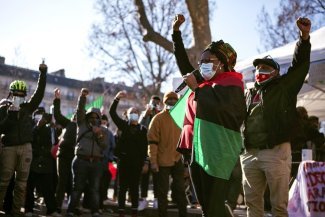Sam Wallman is an Australian cartoonist and some-time trade union organiser for the National Union of Workers (NUW). His 2014 comic At Work Inside Our Detention Centres: A Guard’s Story offers a rare insight into the running of Australia’s outsourced detention centres. Here, he talks to Equal Times about Australia’s militarised borders and ending the attack on indigenous communities at home.
The former Australian Prime Minister Tony Abbott recently made world headlines when he urged European leaders to follow the Australian example and close their borders to refugees. What are your thoughts on this?
The Australian government has tried to project the argument that their attempts to stop all boats containing asylum seekers is occurring on humanitarian grounds. Their rhetoric insists that if you care about refugees, then you should support the government’s policy, otherwise people are going to drown when their boats attempt to reach Australia, because the oceans are so rough. In reality, this is astounding hypocrisy, because their central strategy involves the military intercepting all of these incoming boats, and dragging them back out to the ocean. This happens even if the vessels are leaking and only have enough supplies just to reach Australia. The Australian military is dragging boatloads of refugees into international waters and leaving them to drown. It is illegal for the authorities to report on such occurrences, so we never even hear about it, but it is happening right now.
What did you discover during your work on Australia’s refugee policy?
The whole world has been watching Australia as a sort of testing ground for immigration policy. Especially as nation states prepare for the effects of climate change, and the mass migrations of people moving around the globe that we will soon see. Unless we can effectively resist these policies, then we are certainly going to see these militarised border policies exported to other countries. For example, we saw Australia leading by the worst possible example with the Rohingya crisis earlier this year – when people were floating in the middle of the ocean, we had all these governments in the Asia-Pacific making the point that if even Australia refused to accept these people, then why should the much poorer, developing countries in the region be expected to take them in? Australia is the richest country in the region, and they set the standard on that occasion. They normalised the brutality of leaving boats full of asylum seekers floating on the ocean, left to become what the UN called “floating coffins”. This kind of thing hasn’t happened since the Second World War. If Australia does not change, these attitudes and policies risk being one of our biggest exports to the rest of the world. And if this does continue, Australia should expect a Boycott, Divestment and Sanctions campaign similar to those imposed on Israel and South Africa.
Why are refugees that are denied entry to Australia being deported to poorer countries such as Papua New Guinea?
Australia has one of the most privatised prison systems on the planet. Every single one of the country’s immigration detention centres is run by a large multinational corporation, rather than the government, including the ones we have set up in other countries. Our conventional prisons are also largely privatised. Apparently we have a higher percentage of privatised prisons than the US. A separate but relevant point is related to Aboriginal Australians, who are policed and imprisoned at astounding rates. There are more Indigenous Australians in prison now than there were Black South Africans in jail during the Apartheid era. Aboriginal Australians make up only around 2 per cent of the population, but make up 25 per cent of the prison population. These issues are all connected – the militarised border, the lack of Aboriginal control of the land, corporate domination of everyday life. In some small towns, the only job you can get is working for a private prison. The prison industrial complex is becoming enmeshed with the fabric of everyday life. What is remarkable is just how quickly these things become normalised.
Australia’s First Peoples face discrimination in education, employment, housing and healthcare. In his 2013 documentary Utopia the veteran journalist John Pilger describes the situation as apartheid. What are your views on the situation facing Indigenous Australians and on former Prime Minister Kevin Rudd’s apology on the "stolen generations"?
I’m not really comfortable offering a running commentary on the struggle of Aboriginal people, so this is difficult to respond to. I will say, in relation to Rudd’s apology, that a lot of people saw it as pure theatre. Because at the same time as offering this symbolic apology, he expanded the ‘Northern Territory Intervention’, which was a set of policies that required the Racial Discrimination Act to be suspended for the first time since it was introduced in the 1960s. This was part of an attempt to push Aboriginal people out of remote communities, away from their traditional way of life, and into larger cities, so thatmining licenses would be easier to obtain on the huge swathes of land.
It was announced recently that 150 remote Aboriginal communities around the country would have their services cut off, and that the townships would be forcefully closed down. This has never happened to a majority white township, and it is unimaginable that it would ever happen to such a place. The prime minister at the time, Tony Abbott, said that taxpayers should not have to pay for services to towns that were based upon “lifestyle choices”, rather than acknowledging the 50,000 years of deep connection to the land that these people have. We saw many massive rallies to oppose these closures, including several that shut down cities around the country. The idea was that if the government wanted to close Aboriginal communities of their choosing, then the citizens would choose to shut down the major cities also.
What is the main challenge for trade unionism in Australia, and how might comics help with these challenges?
The challenges facing trade unionism right now are the same challenges as those faced by the whole of the developed world. The notions of individualism and neoliberalism, and the normalisation of these things. Comics might be useful in these attempts, because they can explain complex ideas in an accessible manner. Collectivism is the central idea of unionism, and it is a notion that isn’t as intuitive to people as it has been in the past. So we can’t really assume that people will automatically understand that it makes sense to stick together. Comics and cartoons are a way to slip dry political or historical messages to people, without them feeling bored or like they’re doing hard work. People read comics with their defenses down, for whatever reason. Even my grandmother, every day she reads the paper, and she turns straight to the political cartoon section. When someone decodes a political cartoon, by working out which symbol means what, which character represents which politician, people feel like they understand the forces that are governing their life a little bit more. That’s a good feeling.
What do you think about the Charlie Hebdo events and the debate they sparked about freedom of speech?
I felt quite conflicted about that whole situation. No one deserves to be killed, obviously, that goes without saying. But in Syria you have so many political cartoonists being killed. Where is the outrage? I would like to see a vigil for the cartoonists killed in Israel and the occupied territories. With the same world leaders in attendance who grieved for Hebdo, also grieving for the Palestinian cartoonist Naji Salim al-Ali, the creator of Handala [al-Ali was shot in the face in London in 1987 by an unknown assassin]. I think that there are limitations to the idea of freedom of speech, which we all observe and respect in our day-to-day lives. But if someone wants to talk further about Hebdo, then let’s also talk about Western Imperialism in the Middle East, endless cycles of war, and Islamophobia. In the political discourse after that event, you were expected to be either with the Charlie Hebdo magazine, or against it, but I think that situation calls for more subtlety of thought than that.









